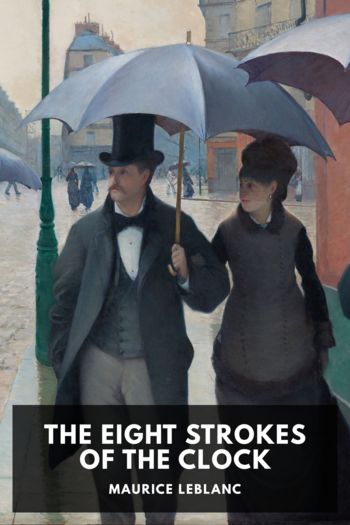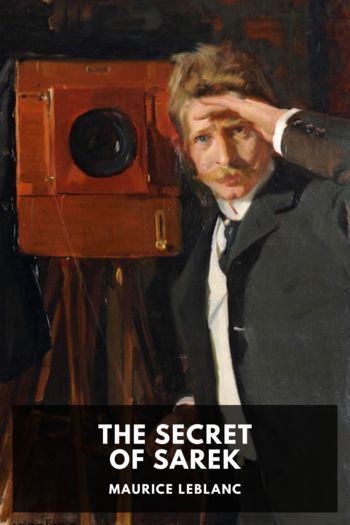The Eight Strokes of the Clock - Maurice Leblanc (reading in the dark .TXT) 📗

- Author: Maurice Leblanc
Book online «The Eight Strokes of the Clock - Maurice Leblanc (reading in the dark .TXT) 📗». Author Maurice Leblanc
Leaning over the young man, with all his implacable force of will he compelled him to write, guiding his hand and dictating the sentences. Dutreuil, exhausted, at the end of his strength, wrote as he was told.
“Here’s the confession, Mr. Chief-inspector,” said Rénine. “You will be good enough to take it to M. Dudouis. These gentlemen,” turning to the waiters, from the restaurant, “will, I am sure, consent to serve as witnesses.”
And, seeing that Dutreuil, overwhelmed by what had happened, did not move, he gave him a shake:
“Hi, you, look alive! Now that you’ve been fool enough to confess, make an end of the job, my gentle idiot!”
The other watched him, standing in front of him.
“Obviously,” Rénine continued, “you’re only a simpleton. The hatbox was fairly burnt to ashes: so were the notes. That hatbox, my dear fellow, is a different one; and those notes belong to me. I even burnt six of them to make you swallow the stunt. And you couldn’t make out what had happened. What an owl you must be! To furnish me with evidence at the last moment, when I hadn’t a single proof of my own! And such evidence! A written confession! Written before witnesses! … Look here, my man, if they do cut off your head—as I sincerely hope they will—upon my word, you’ll have jolly well deserved it! Goodbye, Dutreuil!”
Downstairs, in the street, Rénine asked Hortense Daniel to take the car, go to Madeleine Aubrieux and tell her what had happened.
“And you?” asked Hortense.
“I have a lot to do … urgent appointments. …”
“And you deny yourself the pleasure of bringing the good news?”
“It’s one of the pleasures that pall upon one. The only pleasure that never flags is that of the fight itself. Afterwards, things cease to be interesting.”
She took his hand and for a moment held it in both her own. She would have liked to express all her admiration to that strange man, who seemed to do good as a sort of game and who did it with something like genius. But she was unable to speak. All these rapid incidents had upset her. Emotion constricted her throat and brought the tears to her eyes.
Rénine bowed his head, saying:
“Thank you. I have my reward.”
III The Case of Jean Louis“Monsieur,” continued the young girl, addressing Serge Rénine, “it was while I was spending the Easter holidays at Nice with my father that I made the acquaintance of Jean Louis d’Imbleval. …”
Rénine interrupted her:
“Excuse me, mademoiselle, but just now you spoke of this young man as Jean Louis Vaurois.”
“That’s his name also,” she said.
“Has he two names then?”
“I don’t know … I don’t know anything about it,” she said, with some embarrassment, “and that is why, by Hortense’s advice, I came to ask for your help.”
This conversation was taking place in Rénine’s flat on the Boulevard Haussmann, to which Hortense had brought her friend Geneviève Aymard, a slender, pretty little creature with a face overshadowed by an expression of the greatest melancholy.
“Rénine will be successful, take my word for it, Geneviève. You will, Rénine, won’t you?”
“Please tell me the rest of the story, mademoiselle,” he said.
Geneviève continued:
“I was already engaged at the time to a man whom I loathe and detest. My father was trying to force me to marry him and is still trying to do so. Jean Louis and I felt the keenest sympathy for each other, a sympathy that soon developed into a profound and passionate affection which, I can assure you, was equally sincere on both sides. On my return to Paris, Jean Louis, who lives in the country with his mother and his aunt, took rooms in our part of the town; and, as I am allowed to go out by myself, we used to see each other daily. I need not tell you that we were engaged to be married. I told my father so. And this is what he said: ‘I don’t particularly like the fellow. But, whether it’s he or another, what I want is that you should get married. So let him come and ask for your hand. If not, you must do as I say.’ In the middle of June, Jean Louis went home to arrange matters with his mother and aunt. I received some passionate letters; and then just these few words:
“There are too many obstacles in the way of our happiness. I give up. I am mad with despair. I love you more than ever. Goodbye and forgive me.”
“Since then, I have received nothing: no reply to my letters and telegrams.”
“Perhaps he has fallen in love with somebody else?” asked Rénine. “Or there may be some old connection which he is unable to shake off.”
Geneviève shook her head:
“Monsieur, believe me, if our engagement had been broken off for an ordinary reason, I should not have allowed Hortense to trouble you. But it is something quite different, I am absolutely convinced. There’s a mystery in Jean Louis’ life, or rather an endless number of mysteries which hamper and pursue him. I never saw such distress in a human face; and, from the first moment of our meeting, I was conscious in him of a grief and melancholy which have always persisted, even at times when he was giving himself to our love with the greatest confidence.”
“But your impression must have been confirmed by minor details, by things which happened to strike you as peculiar?”
“I don’t quite know what to say.”
“These two names, for instance?”
“Yes, there was certainly that.”
“By what name did he introduce himself to you?”
“Jean Louis d’Imbleval.”
“But Jean Louis Vaurois?”
“That’s what my father calls him.”
“Why?”
“Because that was how he was introduced to my father, at Nice, by a gentleman who knew him. Besides, he carries visiting-cards which describe





Comments (0)